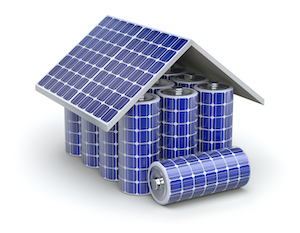Energy Efficiency
How to power your entire home or making your home more sustainable
Choosing the right home battery system starts with determining how you want to use the system. That’s typically broken down into four basic areas: reducing electrical costs, providing back up power in case of a power outage, powering your entire home or making your home more sustainable.
 You also must consider many of the technical details involved with using solar power storage. While a home battery system can help you take advantage of renewable wind and solar energy, it also will require quite a bit of planning and research on your part.
You also must consider many of the technical details involved with using solar power storage. While a home battery system can help you take advantage of renewable wind and solar energy, it also will require quite a bit of planning and research on your part.
A good place to start is to see what others are buying. Some of the most popular current home battery systemsinclude:
Almost all systems can be used for the different reasons below, but some will work better in some areas than others. That’s why it’s important to take the next step.
Most people have a specific goal in mind when they buy a home battery system. Determining which system is best for you requires knowing your ultimate goals. They usually fall into one of the following four categories.
If you want to use solar power storage to reduce your electric bill, you’ll first want to consider which appliances you want to run off solar energy. Or you may want to use the back-up energy only during peak usage time to cut costs. Knowing how you want to use the battery helps you determine the inverter size required to meet your needs. In terms of costs, you’ll want to research how much it will cost to put in the battery vs. how much it will save you per month so you will know when you reach the “break-even” point and start to save money.
If you want to store energy for backup in case of a power outage, then you will need to determine what battery you want based on the power needed to run needed systems (such as AC or the refrigerator). You also want to determine how you would want to run these from a backup system and how much stored energy you need to meet that goal.
Much of the same issues apply here, but you must determine how much energy you need every day to power everything in your home if you want to go completely off-grid. You also will still need access to the power grid in case of emergencies. This may also require you checking to see if local laws allow you to completely power your home using a solar battery.
This is the primary reason many people install a battery, and it’s an open-ended idea that allows you to ease into using more stored energy and less power from the grid. The key here is to set an initial goal for how much sustainable energy you want to use and then buy a battery that can meet that goal and even beyond it for when you want to cut back further.
Based on how you want to use the system, you can now determine issues such as each system’s capacity and power, depth of discharge (how much energy you can use from the battery before you must recharge it), and battery life and warranty.
Buying a battery for your home requires a lot of research and planning. Batteries come in many different sizes and capacities. It’s important to first decide how much renewable energy you want to use and then buy to meet that goal. You can also go further as you become more used to getting your power from renewable resources.